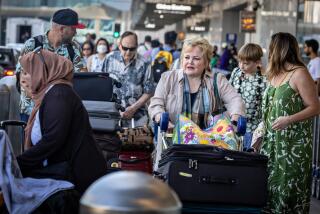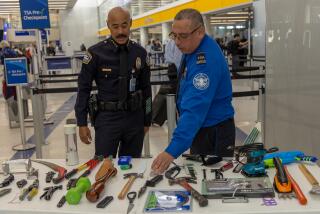TSA chief defends body scanners, pat-downs
- Share via
Reporting from Washington — The head of the Transportation Security Administration refused to back down from using aggressive pat-downs and full-body scans at airports, telling a Senate committee on Wednesday that the screenings were necessary to protect the nation’s fliers.
TSA Director John Pistole said the pat-downs, which include searches of passengers’ genital areas, and scanners that reveal nude images of their bodies would have found the explosives on an alleged would-be airline bomber last Christmas Day. Umar Abdulmutallab is accused of boarding a flight bound for Detroit with explosives in his underwear that went undetected by metal detectors.
Pistole told the Senate Commerce Committee that the Detroit attempt prompted the TSA to develop the new procedures, but their gradual phase-in was accelerated after the Yemen package bomb plot last month.
A week before the Thanksgiving travel crush, some passengers and pilots have complained that the searches — particularly the pat-downs — are too invasive.
“I wouldn’t want my wife to be touched in a way that these folks are being touched. I wouldn’t want to be touched that way. And I think that we have to be focused on safety, but there’s a balance,” said Republican Sen. George LeMieux of Florida. “I think we’ve gone to right field.”
But Pistole responded that his job was “to find that balance, recognize the invasiveness of it — and also recognize that the threats are real, the stakes are high and we must prevail.”
Pilots unions also are fighting the additional measures, saying pilots should continue going through metal detectors only. The Allied Pilots Assn. told its members that the cumulative effect of frequent full-body scans could be harmful, given that pilots are already exposed to higher doses of cosmic rays during long flights at high altitudes.
Studies conducted on the full-body scanners by the Food and Drug Administration, the National Institute of Science and Technology and Johns Hopkins University concluded that radiation from the scans is minimal, Pistole said.
Michael Roberts, a commercial pilot from Memphis, filed a lawsuit Tuesday saying that the new procedures violate his constitutional protection against unnecessary search and seizure.
Pistole acknowledged in a previous Senate hearing that pilots already are trusted with the aircraft and may not need as much additional screening. He said the TSA would announce new procedures for pilots “in the near future.”
The stepped-up screening procedures are a result of a security review initiated by Pistole, who said upon taking office in July that he had found several reports that concluded existing security procedures would not stop someone from carrying explosives hidden in his underwear.
A CBS News poll released Monday showed that 81% of Americans think airports should use full-body scanners to screen passengers.
The public outcry has been more focused on the pat-downs, which require TSA agents to search for explosives near passengers’ genitals using the open palms of their hands and fingers.
The TSA has installed 365 full-body scanners in 68 airports across the U.S. The agency wants to have 500 installed by the end of the year, and 1,000 by the end of 2011.
A loose network of groups is calling for a boycott of the full-body scanners on the day before Thanksgiving — one of the biggest travel days of the year. The campaign could cause long delays in security lines if many passengers refuse to go through the scanners and must be subjected to pat-downs.
Some experts argue that the new procedures could make passengers uncomfortable without providing a substantial increase in security. “Security measures that just force the bad guys to change tactics and targets are a waste of money,” said Bruce Schneier, a security expert who works for British Telecom.
But Rick Nelson, director of the Homeland Security and Counterterrorism Program at the Center for Strategic and International Studies, said that the full-body scans were an effective tool and that objections to the new procedures were overblown.
More to Read
Sign up for Essential California
The most important California stories and recommendations in your inbox every morning.
You may occasionally receive promotional content from the Los Angeles Times.














